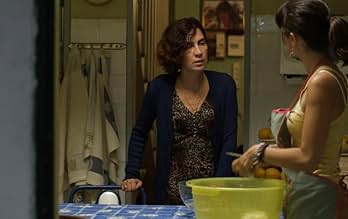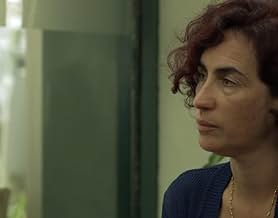PUNTUACIÓN EN IMDb
7,3/10
2,1 mil
TU PUNTUACIÓN
Añade un argumento en tu idiomaA regular family living in the outskirts of Lisbon sees the serenity of their lives shaken beyond any remedy within a week.A regular family living in the outskirts of Lisbon sees the serenity of their lives shaken beyond any remedy within a week.A regular family living in the outskirts of Lisbon sees the serenity of their lives shaken beyond any remedy within a week.
- Premios
- 21 premios y 9 nominaciones en total
Maria João Vaz
- Algarvio
- (as João Vaz)
Reseñas destacadas
SANGUE DO MEU SANGUE is the most recent film from João Canijo, a respectable Portuguese director. Like other movies he has done before it combines drama with realistic "social" cinema in a very personal and distinctive kind of cinematography. In fact in this movie he keeps the same genre of plot, characters, sets, script and camera work he already did in previous works like SAPATOS PRETOS or GANHAR A VIDA. Canijo always does movies about dark themes, showing us the dark side of society.
This one is no exception. It's a powerful drama about a family which live with low recourses in a working-class neighborhood, in Lisbon's periphery. MÁRCIA (Rita Blanco) is a single mother that lives with her daughter CLAUDIA (Cleia Almeida), son, JOCA (Rafael Morais) and sister, IVETE (Anabela Moreira). CLAUDIA is studying in college to be a nurse, unlike JOCA who fell in the world of criminality (without his family to know though ). IVETE is a single woman in her 30s and has a very solitary life All these characters perform two parallel stories, both quite dramatic and intense The first one is about CLAUDIA and her relationship with a teacher (much older than her of course) and the second one is about JOCA and the drugs he stole from his dealer, TELMO (Nuno Lopes), in order to make some money; but TELMO will find out and things will not be easy to JOCA
This movie, which is always set in a context of social misery, shows us these two complex and multifaceted stories about forbidden love, desolation, sadness, misery (social and human...), frustration, betrayal and revenge.
I enjoyed the acting, I think it's generally good, but I have to mention the performances of Rita Blanco, Anabela Moreira, and Nuno Lopes. These actors really do a great job! About the director's work I also think it's good, in his own personal way, but I must say I found a bit confusing those scenes where there're parallel talks (at parts we see parallel conversations in the same scene and it's really confusing to have two pairs of people talking different issues at the same time. Watch these scenes with subtitles would be even better!...).
All in all it's a good Portuguese film and I score it 7/10.
This one is no exception. It's a powerful drama about a family which live with low recourses in a working-class neighborhood, in Lisbon's periphery. MÁRCIA (Rita Blanco) is a single mother that lives with her daughter CLAUDIA (Cleia Almeida), son, JOCA (Rafael Morais) and sister, IVETE (Anabela Moreira). CLAUDIA is studying in college to be a nurse, unlike JOCA who fell in the world of criminality (without his family to know though ). IVETE is a single woman in her 30s and has a very solitary life All these characters perform two parallel stories, both quite dramatic and intense The first one is about CLAUDIA and her relationship with a teacher (much older than her of course) and the second one is about JOCA and the drugs he stole from his dealer, TELMO (Nuno Lopes), in order to make some money; but TELMO will find out and things will not be easy to JOCA
This movie, which is always set in a context of social misery, shows us these two complex and multifaceted stories about forbidden love, desolation, sadness, misery (social and human...), frustration, betrayal and revenge.
I enjoyed the acting, I think it's generally good, but I have to mention the performances of Rita Blanco, Anabela Moreira, and Nuno Lopes. These actors really do a great job! About the director's work I also think it's good, in his own personal way, but I must say I found a bit confusing those scenes where there're parallel talks (at parts we see parallel conversations in the same scene and it's really confusing to have two pairs of people talking different issues at the same time. Watch these scenes with subtitles would be even better!...).
All in all it's a good Portuguese film and I score it 7/10.
This sprawling drama about a Portuguese family combines melodrama and social realism so inventively that it practically occupies a genre of its own. Writer-director Joao Canijo grounds the movie in vivid observations of the Lisbon public housing complex where much of the action occurs, and his characterizations—developed, Mike Leigh-style, in close collaboration with the cast--have a similarly gritty authenticity. Yet the movie is also richly stylized, with old- fashioned tracking shots and compositions that allow for two conversations at once, and some narrative developments have the force of Greek tragedy. What emerges is an operatic portrayal of the working poor in which each character's struggle seems monumental. Rita Blanco and Rafael Morais are on top of their game with such deep and complex acting that makes us shiver. One of the best movies I've seen, ever! And definitely the best of 2011.
I would have really liked to give this film 8-9 stars. Excellent photography and editing, which make the spectator feel with great realism the claustrophobic atmosphere of the tiny family house of the protagonists and other sceneries of the film. A masterly use of the sounds surrounding the action, with the omnipresent background noise of the TV and the various noises from the neighborhood which add authenticity to the scenes and the story. Very good performances of all actors. And a solid story about the lives of the members of a working class family, with perfectly depicted one-to-one and overall interactions between them, and which develops seamlessly and with increasing interest throughout the film (despite its more than 3 hours of length!). You feel a part of the scene often, understanding the attitudes and reactions of the different personages, each with a particular story at the center of his/her life, yet affected and conditioned by the relation and interactions with the rest of the personages.
Then why that weird soap opera-like twist with references to a Greek myth in the middle of the film???. It adds nothing to it, and instead makes the story less sound and consistent, twisted, and more proper of a TV serial. Few times a very good film was spoiled by so little, but so it is...
Then why that weird soap opera-like twist with references to a Greek myth in the middle of the film???. It adds nothing to it, and instead makes the story less sound and consistent, twisted, and more proper of a TV serial. Few times a very good film was spoiled by so little, but so it is...
I hope the members of the Academy see Blood of My Blood and nominate the film for Best Foreign Language Film. It is a Cassavetes/Scorsese/Tarantino kind of thriller, that will dry your goats. It's a thriller made of human dramas, rather than suspense or action, with great acting and a modern way of filming. Director Joao Canijo made use of surround sound and camera angles in order to have a complete view of two sequences/discussions at the same time, making ich view more defying.
Besides, Portugal never got a nomination from the Academy, and in the current crisis, no film is being produced or will be if we don't get this recognition. Nominating it will be a statement for Portugal to continue to have an industry.
Besides, Portugal never got a nomination from the Academy, and in the current crisis, no film is being produced or will be if we don't get this recognition. Nominating it will be a statement for Portugal to continue to have an industry.
Joᾶo Canijo is indisputably one of the most interesting contemporary Portuguese movie directors. The four films seen to date, have left an indelible impression on me: Ganhar a Vida, Sapatos Pretos, Noite Escuro and recently Sangue do meu Sangue. His films send a punch to the viewers' guts leaving them breathless, knocked out; they abandon the moviehouse dazed by scenes that will haunt them for days to come.
Sangue do meu Sangue is set in the low working-class Bairro do Padre Cruz, a slum northeast of Lisbon, target to recent architectural projects and municipal efforts to efface its notoriously shady reputation. The film depicts a crosscut of three social classes: firstly the low working class Márcia and her family belong to; secondly the even less privileged Lisbon residents sharing with African immigrants a labyrinthine sub-world reminiscent of what Pedro Costa's trilogy on Fontainhas portrays. Finally the upper middle class represented by the Doctor and his wife living a Portuguese version of the "American dream": active professionals with a daughter who reside in an up-market dream home, two cars in the driveway and a servant at madam's beck and call.
Like Canijo's other films, Sangue to meu Sangue evolves around a central feminine character, Márcia, a single mother who has brought up and supported two children and a live-in sister. The women in Canijo's films are true heroines, resilient but nonetheless victims of their male chauvinistic environment; they inevitably fall prey to the violence perpetrated by men around them, be those pivotal male figures in their lives or simply placed in their paths by destiny. Indeed destiny plays an important role in the scripts Canijo writes. In Sangue do meu Sangue destiny has Cláudia falling in love with a married man linked in some way to her mother's past ─ I'll say no more, not wanting to include a spoiler. Destiny too has a devastating humiliation in store for Ivete, Márcia's sister, at the hands of a ruthless man she doesn't recognize at a karaoke; he remembers her from their schooldays when he had a crush on her. Likewise Márcia attempts to shake off her daughter's destiny, endeavouring at all costs to stop her daughter's love affair with a married man. Claúdia is gullible enough to believe an older married man will jeopardize the cushiness of his marital life, casting off wife and child in exchange for her. Márcia is above all most preoccupied with thwarting the oepidal twist in Canijo's script evoking Greek tragedy. In Greek tragedy no-one can escape what the gods have ordained for them. Canijo plays with the spectator, builds our hopes up that his characters trapped in their precariously balanced lives may just pull through, but just when Joca appears in a deus ex machina ploy to defend his aunt Ivete, we realize that his destiny was to end up behind bars as an adult for a crime graver than what had previously sent him to a reformatory as a minor.
Modern tragedy allows for pathos in ordinary men whose quotidian lives we identify with. The moving relationship between Ivete and her nephew Joca rings of incest. Márcia is busy salvaging her daughter's future whereas Ivete takes upon herself the mission of safeguarding her nephew whose life is jeopardized by an unpaid debt. An unforgettable scene is Ivete and Jaco making their way through the narrow, unsightly, claustrophobic streets of the slum to the house of the drug dealer to settle Joca's debt. We sense imminent danger and the foreboding uneasiness of walking into a maze with no exit, a throwback to the Minotaur of Greek mythology awaiting his victims about to enter his domain. This family's financial constraints oblige them to share a reduced space. Canijo plays and uses this limitation to his advantage; he places the characters in a trap. Márcia, the siblings Cláudia and Joca and her sister Ivete are forced to stretch their capacity for cohabitation to the limit. So reduced a space leaves no room for secrets, the characters learn to lower their voices to maintain a privacy of sorts ─ even when what would really suit them would be to seek relief in shouting out their woes at the top of their voices ─ secrecy is too rare a luxury in a house where mother and daughter share a a tiny bedroom and bed, four people share a tiny bathroom sometimes peeing with the door open, and watching TV means sitting cramped on the settee legs stretched out over the other occupant's lap. Conversation is interrupted by someone crossing the room to get something, by someone coming out of the bathroom, by the normal comings and goings that the house by its nature and especially size imposes on the life of its occupants. Canijo at times divides the screen into two keeping discrete but parallel conversations going simultaneously; not unlike when in an opera a quartet sings, each couple busy with their own theme. This requires the spectators'maximum attention opting for the conversation which contributes more to unfolding of the melodrama.
Above all Canijo's great sense of tempo never lets a scene drag (a common trait to Portuguese cinema). His has an uncanny ability to build crescendo. We become entranced despite the ominous certainty that the ending is bound to be harrowing.
Rita Blanco, Anabela Moreira and Teresa Tavares render magnificent performances. Due praise to Anabela Moreira for what must have been an awfully difficult shooting experience of total frontal and back nudity picked up by the camera with the crudity Canijo's hyper-realism requires. Nothing like it since Isabela Rosselini in Blue Velvet. Mesmerizing and moving is the dignity Moreira imbues her character with, an air of "you can do what you like with my body but you'll never have my soul". The love she professes for her nephew, blood of her blood, which is what the film's title means, elevates her above the sordidness her sacrifice plunges her into.
Sangue do meu Sangue is set in the low working-class Bairro do Padre Cruz, a slum northeast of Lisbon, target to recent architectural projects and municipal efforts to efface its notoriously shady reputation. The film depicts a crosscut of three social classes: firstly the low working class Márcia and her family belong to; secondly the even less privileged Lisbon residents sharing with African immigrants a labyrinthine sub-world reminiscent of what Pedro Costa's trilogy on Fontainhas portrays. Finally the upper middle class represented by the Doctor and his wife living a Portuguese version of the "American dream": active professionals with a daughter who reside in an up-market dream home, two cars in the driveway and a servant at madam's beck and call.
Like Canijo's other films, Sangue to meu Sangue evolves around a central feminine character, Márcia, a single mother who has brought up and supported two children and a live-in sister. The women in Canijo's films are true heroines, resilient but nonetheless victims of their male chauvinistic environment; they inevitably fall prey to the violence perpetrated by men around them, be those pivotal male figures in their lives or simply placed in their paths by destiny. Indeed destiny plays an important role in the scripts Canijo writes. In Sangue do meu Sangue destiny has Cláudia falling in love with a married man linked in some way to her mother's past ─ I'll say no more, not wanting to include a spoiler. Destiny too has a devastating humiliation in store for Ivete, Márcia's sister, at the hands of a ruthless man she doesn't recognize at a karaoke; he remembers her from their schooldays when he had a crush on her. Likewise Márcia attempts to shake off her daughter's destiny, endeavouring at all costs to stop her daughter's love affair with a married man. Claúdia is gullible enough to believe an older married man will jeopardize the cushiness of his marital life, casting off wife and child in exchange for her. Márcia is above all most preoccupied with thwarting the oepidal twist in Canijo's script evoking Greek tragedy. In Greek tragedy no-one can escape what the gods have ordained for them. Canijo plays with the spectator, builds our hopes up that his characters trapped in their precariously balanced lives may just pull through, but just when Joca appears in a deus ex machina ploy to defend his aunt Ivete, we realize that his destiny was to end up behind bars as an adult for a crime graver than what had previously sent him to a reformatory as a minor.
Modern tragedy allows for pathos in ordinary men whose quotidian lives we identify with. The moving relationship between Ivete and her nephew Joca rings of incest. Márcia is busy salvaging her daughter's future whereas Ivete takes upon herself the mission of safeguarding her nephew whose life is jeopardized by an unpaid debt. An unforgettable scene is Ivete and Jaco making their way through the narrow, unsightly, claustrophobic streets of the slum to the house of the drug dealer to settle Joca's debt. We sense imminent danger and the foreboding uneasiness of walking into a maze with no exit, a throwback to the Minotaur of Greek mythology awaiting his victims about to enter his domain. This family's financial constraints oblige them to share a reduced space. Canijo plays and uses this limitation to his advantage; he places the characters in a trap. Márcia, the siblings Cláudia and Joca and her sister Ivete are forced to stretch their capacity for cohabitation to the limit. So reduced a space leaves no room for secrets, the characters learn to lower their voices to maintain a privacy of sorts ─ even when what would really suit them would be to seek relief in shouting out their woes at the top of their voices ─ secrecy is too rare a luxury in a house where mother and daughter share a a tiny bedroom and bed, four people share a tiny bathroom sometimes peeing with the door open, and watching TV means sitting cramped on the settee legs stretched out over the other occupant's lap. Conversation is interrupted by someone crossing the room to get something, by someone coming out of the bathroom, by the normal comings and goings that the house by its nature and especially size imposes on the life of its occupants. Canijo at times divides the screen into two keeping discrete but parallel conversations going simultaneously; not unlike when in an opera a quartet sings, each couple busy with their own theme. This requires the spectators'maximum attention opting for the conversation which contributes more to unfolding of the melodrama.
Above all Canijo's great sense of tempo never lets a scene drag (a common trait to Portuguese cinema). His has an uncanny ability to build crescendo. We become entranced despite the ominous certainty that the ending is bound to be harrowing.
Rita Blanco, Anabela Moreira and Teresa Tavares render magnificent performances. Due praise to Anabela Moreira for what must have been an awfully difficult shooting experience of total frontal and back nudity picked up by the camera with the crudity Canijo's hyper-realism requires. Nothing like it since Isabela Rosselini in Blue Velvet. Mesmerizing and moving is the dignity Moreira imbues her character with, an air of "you can do what you like with my body but you'll never have my soul". The love she professes for her nephew, blood of her blood, which is what the film's title means, elevates her above the sordidness her sacrifice plunges her into.
¿Sabías que...?
- CuriosidadesPortugal's official submission to the Best Foreign Language Film category of the 85th Academy Awards 2013.
Selecciones populares
Inicia sesión para calificar y añadir a tu lista para recibir recomendaciones personalizadas
- How long is Blood of My Blood?Con tecnología de Alexa
Detalles
- Duración2 horas 11 minutos
- Color
- Mezcla de sonido
- Relación de aspecto
- 1.85 : 1
Contribuir a esta página
Sugerir un cambio o añadir el contenido que falta































